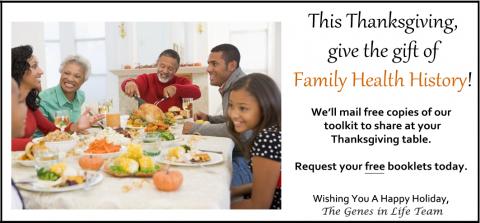Blog and News
Blog & News
Hot Topics
Do You Know Your Family Health History?
-

The blog post below was taken from GenesInLife.org.
Each year Thanksgiving is named Family Health History day in honor of the Surgeon General’s Family Health History initiative. This national public health campaign encourages all American families to learn more about their family health history. As you may already know, your family health history tells more than just what diseases run in your family. It includes information about where your family has lived and what kind of work and activities they do. This can help you see where you and your family face risks to your health. Your healthcare provider can help you understand these risks and suggest the steps to prevent disease or make it less harmful.
Family health history has been recognized as a staple in preventive healthcare, and for many years creative minds have been developing new ways to integrate family health history into patient care with very exciting results. The first step in using family health history for preventive care is of course that families should collaborate to collect this valuable health information and share it with their relatives and physicians. The following resources have been designed for individuals and families as user-friendly tools for collecting a family health history and sharing it with a healthcare provider.
Does it Run in the Family? Toolkit
The Does It Run In the Family? toolkit consists of two family-friendly booklets, A Guide to Family Health History and A Guide to Genetics and Health. A Guide to Family Health History explains the importance of family health history, how to collect it, and how to organize it. A Guide to Genetics and Health explains the basics of genetics and why it is an important factor to your health. This second booklet also gives information on conditions that can run in the family, such as heart disease, diabetes, and cancer. Free copies of the Does it Run in the Family? toolkit can be ordered from Genes in Life. You can also visit www.familyhealthhistory.org to customize your own booklets for your family or organization.
The Surgeon General’s My Family Health Portrait Tool
Because family health history is such a powerful screening tool, the Surgeon General has created a new computerized tool to help make it fun and easy for anyone to create a portrait of his or her family's health. This Web-based tool helps users organize family history information and then print it out for their family doctor. In addition, the tool helps users save their family history information to their own computer and even share it with other family members.
Our Family Health tool from Intermountain Healthcare
Intermountain Healthcare’s Clinical Genetics Institute and Homer Warner Center for Informatics Research created this online, easy-to-use tool that allows patients to compile, store, and share information about their children, parents, grandparents and more. The application features “info buttons” that give the user reliable information on diseases. Intermountain Healthcare is currently working on new advanced features for the program that will allow patients the options to share their data with other family members, use their family health history information to generate a report of the conditions for which they might be at risk, upload genetic test results, and more.
Some of the most exciting family health history tools are being developed for use in the doctor’s office to collect health history and integrate the information into the doctor’s visit. Several of these resources are designed to collect information from patients before they even arrive at their appointments so that time spent with a healthcare professional can be more efficient and targeted to the patient’s individual needs. For example, MeTree software, developed at Duke University and the MyFamily tool, developed at Cleveland Clinic, collect personal history on a number of factors before a doctor’s visit and alert a physician if the patient might be at risk for certain types of cancer or other hereditary conditions.
Some other exciting tools streamline the collection of family health information in the doctor’s office. The Pregnancy & Health Profile, created by NCHPEG and partners, is a free tablet-based tool that is designed to replace the paper forms that a woman would normally have to fill out in a prenatal healthcare appointment. The software collects family health history information from the patient and helps prenatal providers and patients identify and discuss risk to make shared, informed decisions about testing and screening options. Building on the framework for the Pregnancy & Health Profile, the American Academy of Pediatrics along with several partners has just launched a similar family health history tool for pediatric providers. This tablet-based tool is also available for free download and was created to collect health history information and improve personalized care for children who are at increased risk for health conditions based on family health history.
The rapid pace of genetic research makes keeping up with the newest relevant findings very difficult. To combat the complexities of an every growing pool of knowledge, Partners HealthCare has developed the GeneInsight Suite®, a three-part software package that provides clinicians with the best possible information and resources to interpret information from genetic testing.
For more information on why you should collect your family health history visit our Genes and Your Health section as well as the information from our spotlight on family health history on the Genes in Life blog and questions answered by our featured experts.
Was this Helpful?
Your input helps us improve the site for parents and practitioners. Leave us feedback about this page.
Was this page helpful?
Ask an Expert
Have a question that’s not answered on Baby’s First Test? Send it to our experts.

Comment on This Post